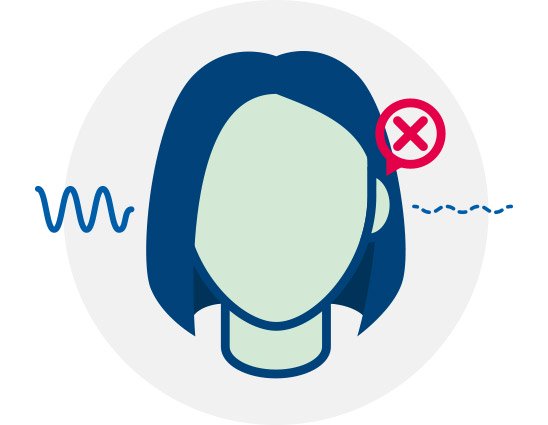Unilateral hearing loss (hearing loss in one ear)

What is unilateral hearing loss?
Unilateral hearing loss (UHL) is when a person experiences normal hearing in one ear and hearing loss in the other ear. In contrast, bilateral hearing loss is when hearing loss is experienced in both ears.
Unilateral hearing loss is a form of hearing loss that affects millions1 of people all around the world. A minority of these have single sided deafness which exists when the affected ear has profound hearing loss.


Book a FREE* hearing check for unilateral hearing loss
Use the form below or quote the 'Audika' website when booking your appointment. All fields required.
Symptoms of hearing loss in one ear
Causes of hearing loss in one ear
There are a number of recognised causes of unilateral hearing loss, including:
- Mastoiditis
- Mumps
- Waardenburg syndrome
- Ménière's disease
- Meningitis
- Microtia
- Labyrinthitis
- Measles
- Acoustic neuroma
- Physical trauma
- Sudden hearing loss

Single sided hearing loss treatment
There are many effective treatment options for hearing loss in one ear (unilateral hearing loss) available, although the results of treatment depend on a broad range of factors and circumstances, as well as its cause.
Typical treatments for unilateral hearing loss include:
- Medical interventions
- Hearing aids
- Bone anchored hearing systems
- Cochlear implants
Book a FREE* hearing check to learn about your hearing needs and discuss potential treatment options with a hearing care expert.
Conductive vs. sensorineural unilateral hearing loss
Unilateral conductive hearing loss
Conductive hearing loss occurs when sounds cannot pass freely through the eardrum or via the tiny bones, known as ossicles, in the middle ear. This results in a loss of sound intensity reaching the hearing nerves.
Conductive hearing loss
Unilateral sensorineural hearing loss
Sensorineural hearing loss, on the other hand, occurs when there is damage to the hair cells in the cochlea (found in the inner ear) or to the nerve pathways which lead from the inner ear to the brain. A person may also suffer from mixed hearing loss, which is a combination of conductive and sensorineural hearing loss.
Sensorineural hearing loss
Oticon hearing aid models
Hearing loss in one ear FAQ’s
Sources & Disclaimers:
1 WHO, World Report on Hearing 20212 Depression and Individuals with Hearing Loss - A Systematic Review







